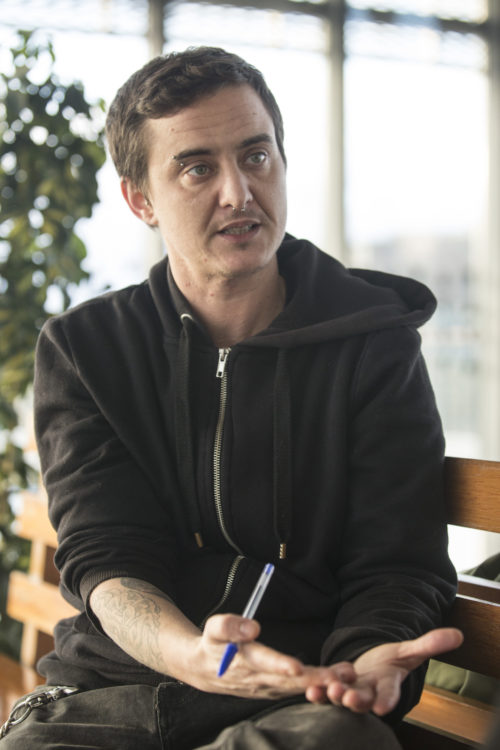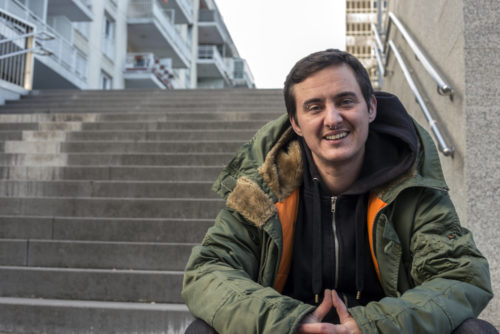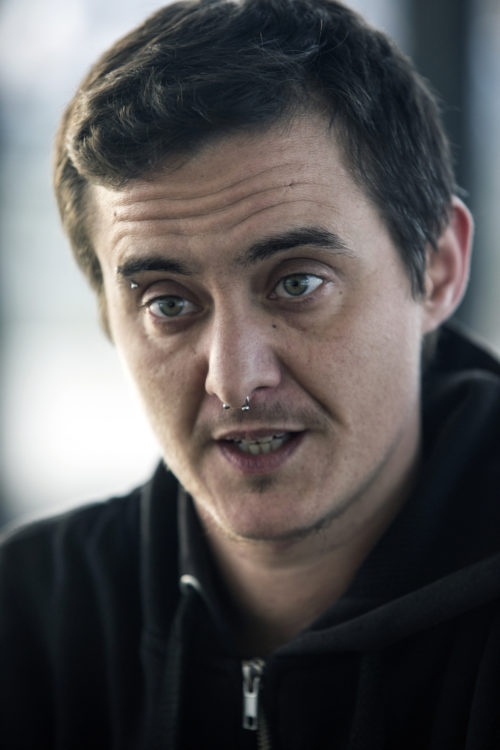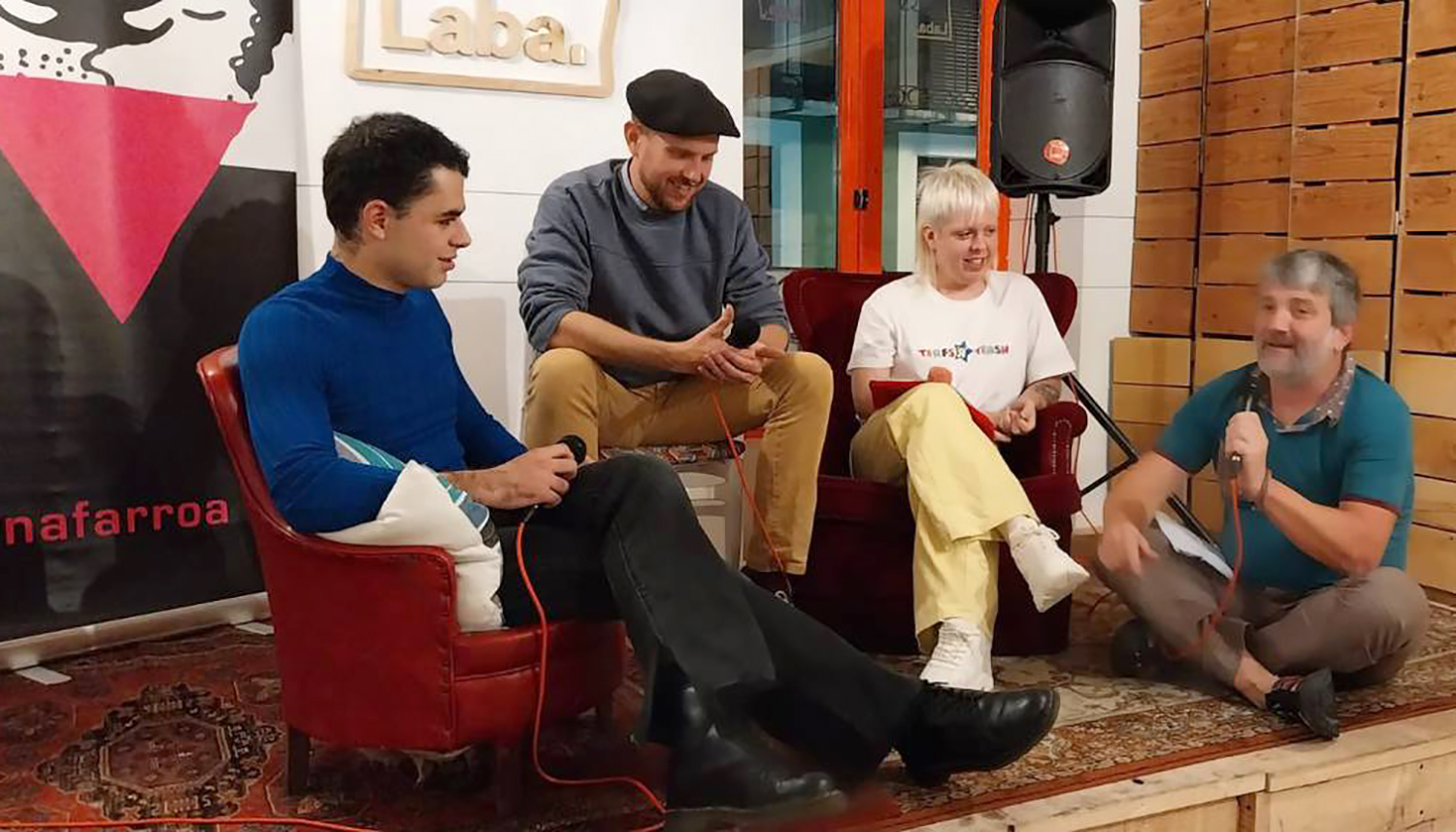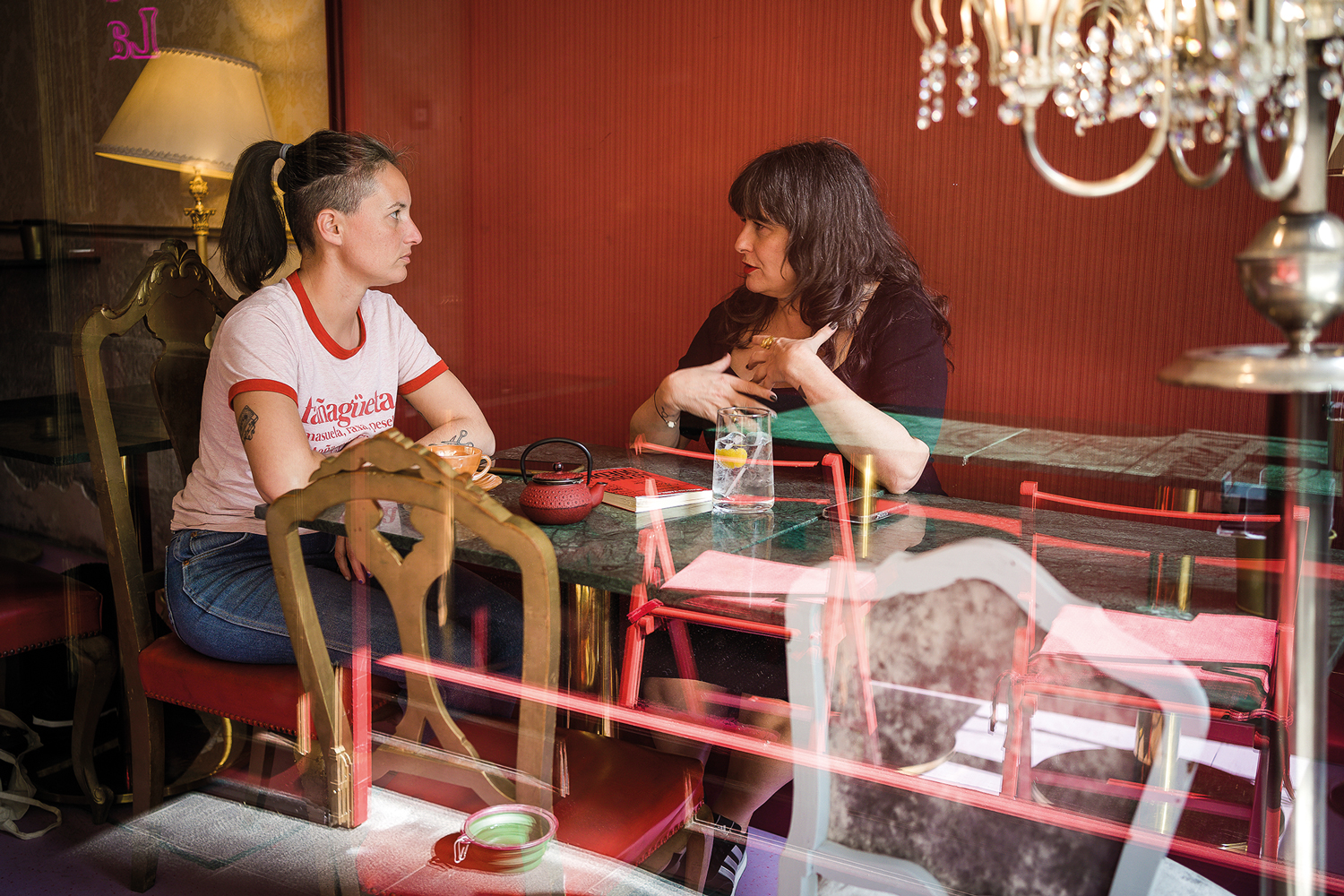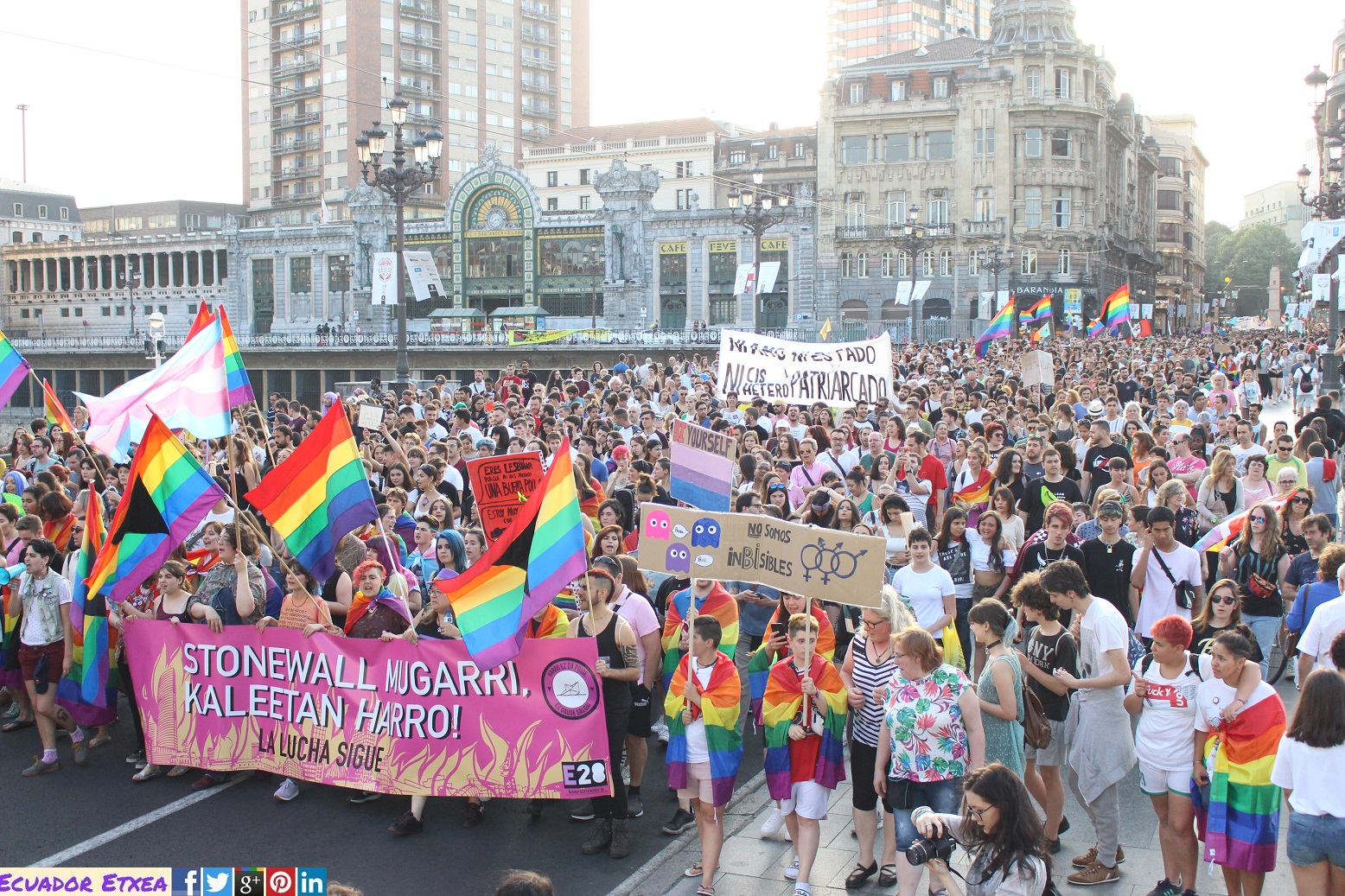Plazandreok started his political career on the platform by Josebe Iturrioz (Ordizia, 1978) and in 2000 he founded the transfeminist group Medeak along with other members. Medeak has worked hard to integrate transfeminist discourses and approaches in Euskal Herria, and according to Iturrioz the contribution of transfeminism to the feminist movement of Euskal Herria has been very positive.
They explain that being a Trana is being born in a mixed body. Is there a single way to have a trance?
No, of course. There are many ways to be transsexual as much as a transsexual person. What is happening is that, unfortunately, the format to which you referred has been extended a great deal. The logic it generates is absolutely dual, which divides the body and the psyche. According to this approach, your body is confused. In my opinion, bodies do not mix, societies and their gender regimes mix. Women and men are defined by opposition, and all bodies that we don't enter into those two sexual brands are being conflicted. Our bodies suffer from those collateral pains of the rules of society.
I understand transsexuality better, and I also believe that this vision allows a healthier relationship with bodies. That is, to think that your hair or your face are not conditioning factors of masculinity and femininity, but you can be a barren woman, a alluded man, a woman with a penis, a woman with short hair, etc.
For me, there's the problem. What is the way to create other meanings of our bodies that make our lives more livable and sustainable? How do we really create a bodily self-determination where everyone manages their gender identity, their sexual orientation and their sexual practices in whatever way they can and want?
So does transfeminism put gender binarism at the forefront?
Binarism is a very profound concept. Binarism is a way of organizing the world. When we organize the world, we define men and women as opposed: black or white, man or woman, false or true, etc. In addition, we organize these binary categories in a hierarchical way. This idea is very important for understanding the intersectionality of discrimination. The rich white man, for example, will be located at the top of the hierarchy and will have categories opposed to it.
These categories are mutually exclusive, and as we understand them as opposition, we do not have the possibility to think that we can have different characteristics. They are opposite categories, but we understand it very well when we say, ‘this guy is very feminine’. In addition, the ways of being female boys are very varied. There may be a guy who looks very masculine but has a special sensitivity. So is that guy no longer a guy? Do you have to remove a guy from the possibility of having female characteristics?
Biology also has a lot to do with these speeches. For example, the Vox party, now in full swing, has a very biologicist discourse. In my opinion, sex is not dual, it's a continuum. From a biological point of view, it seems that in the development of the genital characteristics of children, all human beings have the grain, and hence the genitals develop. In this process, the sexes are not in these two extreme groups, the male or the female, but in that line or continuum that exists between both categories. Bodies move in that line, from one end to the other. We must get out of that dualism and understand the complexity of bodies.
In recent times, the visibility of transsexuality has increased. How does the imaginary spread on television and in the media?
Very stereotyped. With a great point of sensationalism. Then there are more serious programs that try to give depth to the subject, but always from very personal testimonies. In addition, they give voice to certain very specific models of transsexuals, such as those who are very clear about the transition and those who have made an obvious change of name when naming themselves. There are usually no other eyes that question the same system.
They keep taking transsexuals as objects of sperm analysis. They deal with the issue from sensationalism and attach importance to morbid elements. Very frequent questions are whether this person takes his breasts or puts his penis instead of explaining the approach that is in the background. These kinds of questions are not addressed to heterosexual people. We don't usually know anything about your genitals: we don't know if you're missing a testicle or if you've had a circumcision. The media attaches importance to the pornographic dimension of transsexuality.
When did you start militating in the feminist movement?
When I was 17 or 18, I began to realize that I had a very strong feeling inside of myself. I felt like my life was stolen. So when I was 19 years old, I walked into college on the Plazandreok platform. The age difference was huge, but I spent many years in group. In the year 2000, we created the Medeak group of Plazandreok. It emerged in a very innocent way, we were always looking to take the street. At that time feminism was in decline, and there was a conflict between the autonomous feminist movement and the mixed movement. We, on the other hand, were very strong. We wanted to wave the flags and we wanted to make a revolution. So we started, doing street theater, doing concentrations…
At the beginning of Medeak’s journey, very powerful days were essential and began to be programmed in Arteleku from 2003 onwards. Beatriz Preciado and the reaction group [a feminist art group formed by Azucena Vieites and Estibaliz Sadaba] began to participate. That's where we started our activity.
In 1999 they translated into Spanish The disputed gender of Judith Butler [Gender Trouble, 1990] and although we tried, we did not understand anything hostile. We began to ask ourselves and those around us the question, "What is queer?" Through our activities in Arteleku, we really began to understand what queer approaches were. There we also started to hold drag king workshops and to work with very diverse groups with innovative artistic practices. We started creating networks at the state level. It was then that the monster of Basque transfeminism emerged.
In Euskal Herria, they put many approaches upside down. What contributions has transfeminism made to the feminisms of Euskal Herria?
In Euskal Herria we came from a feminist tradition that had in the center the triple oppression (class, nation and gender), and we at one point put ourselves in crisis as a concept to the woman herself. This, in part, caused some concern, of course. But on the other hand, these new approaches were very welcome. In short, transfeminist ideas facilitate the possibility of incorporating other types of discourse, such as decolonial discourses and speeches of functional diversity. It also allows us to establish alliances in a different way.
Now comes to the Basque Country the most conflicting debate on prostitution that takes place from Spain. In Euskal Herria, around prostitution, we have organized our debates in a different way. On the other hand, in Euskal Herria, for example, ten years ago more than one coordinator organizing the demonstration on 8 March stated that lesbianism was not a theme on 8 March. Today it is unthinkable to question it.
I believe that nowadays transfeminism is recognized in the Basque Country, also from classical feminism. We have a very good relationship with other feminist groups, and our contributions have always been taken into account.
Furthermore, I believe that we have influenced these groups, because their speeches have changed. In our environment, there are people who don't think like us, but we've learned to talk to each other. A few years ago, it was unthinkable for many people to introduce a transsexual person into the feminist movement because they didn't see it as a feminist issue. Now, however, all feminists understand that transsexuality is a clear theme of feminism.
You have made a long journey in the transfeminist group Medeak. You have often used drag king workshops as a political tool. What are the possibilities offered by these workshops?
At the beginning of the workshops we held, we worked for four hours impressive theoretical content. It is usually a long master class guided by several people. Then we held a practical workshop of four more hours, and to finish, we tried to go out to the street or to the public spaces. It's an all-day job.
These workshops offer several possibilities, such as the denaturalization of the concepts of femininity and masculinity, the male and female, the questioning of this binomial and the questioning of this strict and rigid definition of the genders. In addition, they enable us to do so in a very practical way. In this practice, people see how masculinity can be built, and they also realize that to build masculinity they have to deconstruct the femininity that they have inside.
Consequently, the participants realize how, being a woman, they use many prostheses and technologies to express the female condition. If you eliminate these techniques and use masculinity techniques well, you can experience a new experience that allows you to ask many questions: What is a man? What is being read as a man? What is it to do an alternative political experience of your body? In addition, workshops allow us to identify the privileges that have taken us away as women.
The workshops are very parodious and physical. They have a cathartic side. Women connect it to traumatic experiences through these workshops. In these years, I've realized that we have a very violent and perverse physical perception of masculinity. In workshops, participants have to create and represent a character, and that requires a job.
So there are very violent profiles of man, paedophiles for example. Sometimes, though, some try to create better masculinities, but they don't work very much. People can have a traumatic experience doing a drag king workshop. Living masculinity can be traumatic for some, especially if masculinity has lived in a very traumatic way and imposed, for example, if they have been subjected to ill-treatment. As a technique, the workshops are very interesting, but what I've seen is that women don't live masculinity in a positive way. However, in general we had a very good time doing workshops.
Another very interesting point is the possibility for men to learn to read differently. You realize that they also interpret their personality. As a result of what I learned in these workshops, many masculinities make me very funny, because they're very hyperbolic. Things as stupid as giving a man a hand come to light. Women don't know how to shake hands with a man. It may seem silly, but it is a matter of power. If you shake a man's hand, you're proving that you understand his codes.
You are considered transgender. Taking as a reference the phrase ‘Personal is political’, which many feminisms have as a motto, how has your political trajectory affected you on a personal level?
Ever since I was a child, I've identified myself as a person who is completely in conflict with the rules of gender and normative bodies. There are reports of transgender people who have always been very clear, but I have never been clear. I don't know if I'm a man or a woman. Furthermore, I do not know to what extent I would like to give you a closed answer to that question. I am now forty years old and looking back I see that the violence I have experienced has been very savage: physical, symbolic, structural… I feel it at all levels of my life.
So, I've needed feminism to survive, and also to understand myself. It's helped me not to go crazy. Feminism generates micro-revolutions and allows you to create a safety net where you don't need to be constantly justified. We talk a lot about the self-determination of territories and, in the face of the self-determination of the body, feminism has been fundamental to understanding my body.
I felt that the feminism I knew lacked something, you couldn't stay there. I was invading a discomfort. So I started feeling interested in queer ideas. I think I'm a very deep person and I can't help but look for myself from an ontological perspective. I always ask these kinds of questions. Who am I?
All my political, theoretical and practical tours have been parallel to those constant concerns. That is why Medea and I very well incarnate the phrase ‘personal is political’. Well, we and most feminists, of course. In the end, all feminists enter feminism because we need a breathing space. A breathing space, after all, is not just a place to do feminist practices, but it allows you to be as you are.
I have always felt very ugly and have always felt unable to fit in my body. When I was going to buy clothes, I thought others were doing well, and I wasn't finding myself. I started to see myself differently in drag king workshops.
Masculinity was a liberating place for me. I understood that I didn't always have to go into the girls' stores and I didn't have to put my bras if I didn't like them. Drag king workshops gave me the opportunity to change in a practical way. I understood very well that clothing was a prosthetic and I saw the opportunity to represent myself as I wanted. That was fundamental to the self-management of the body. My political and personal life is intimately linked. After all, feminism is that.
In drag king workshops, you’ve said prostheses and technologies are used as tools for experimentation. Why did you decide to start taking hormones?
The truth is, I'm pretty conflicting with that, but I think a lot of transsexuals are passing by. When I was about 28 years old, I had a clear definition of transgender. At one point I decided that I didn't need to take hormones and in that state I felt very comfortable. However, I have always had that doubt.
Now I'm starting to take hormones, and for me, hormones are in great danger, because they're synthetic. They create a political representation of masculinity. In other words, the hormones I receive produce the effects that doctors want to produce. My hormones are not natural, they are not taken from a man and they are designed to achieve certain effects. There are men with testosterone, but with breasts. My hormones are meant to shatter my boobs.
In the process, I've decided to take hormones as an experiment. On the one hand, I like the process, but on the other, I have a problem with the idea of hormone, I find it conflicting. Hormones have not been easy at all. It's moved me a lot, and people's perceptions have changed a lot. I have a lot of doubts and a lot of questions. Why be a man? Why be a woman?
In feminism, you feel at home as a woman, but as a transsexual, loneliness is terrible. People naturally throw very painful questions. For example, on the subject of hormones, many asked me: ‘But what do you take the hormones for? That kills, they're bad." And I think, ‘But have you seen yourself? You have been taking birth control for forty years, what are you going to say to me?’ People accept big questions and invasions.
Is surgery the ultimate goal?
There seems to be a single transgender route and there is no other way. This unique journey requires taking hormones, choosing a new name, naming it in male or female, etc. Following this logic, I should call myself a male and I do not: I name myself a female. I use Josebe to name her and my friends call me Itu, it's a neutral name. I have not asked for a change of name and, in principle, I do not want any surgery on my body. Probably, taking hormones is not a constant and safe process. It will have interruptions and it will fluctuate as it is doing today.
I manage my body this way. What I've experienced in drag king workshops has had to do with it, because it's empowered me. It has empowered me to understand myself as transgender. Moreover, I am very reassured that I understand myself as a transgender. I also identify myself as a woman, but the story of my life has some nuances, and transgenerism explains many things to me about myself. I am not a man, nor am I a woman. I don't feel on the side of men until being a man means nothing else.
Now I start taking hormones and looking at boys differently. I often tell young people that I see very macho: I'm taking hormones and I'm sick of the male referents that we have. I see you kicking all the time and that masculinity is terrible. You have to have a responsibility to change that masculinity. I think you can create feminist masculinities.
So drag king and Queer Theory have helped me understand a lot, but my situation is a mess, because I'm always on a ground that belongs to no one. I'm testing it. I'm taking hormones, but I don't want men to name them. That kind of possibility upsets many of people's values.
For many it is much easier for me to say: from now on I will be Antonio, tell me as a male and I will have surgery to have a penis. It's not easy for people, and I'm a short circuit for myself and others. I want to take care of my body because I have one. In addition, a specific model is being processed in the medical system. They don't want people like me.
Taking that challenge to the extreme means putting life on its feet. As physical experimentation begins, the body moves and people's perception changes, and that's noticeable. In addition, there are a lot of people waiting for the moment. When do you have to talk about male? When will the last answer come?’ However, there is no final judgment.
The gender rules set up to find me don't work for me. I need a world that goes beyond the categories of women and men, a world where women with beards and many casuistics come in.
Last year’s feminist strike is seen by many as a milestone. What are the challenges of transfeminism?
We are in a great transfeminist epistemological crisis at the state level. In this conflict, in view of the discourse of some transsexuals, I feel very conflicting. Feminism is becoming part of the mainstream, and all of a sudden, when I read on social networks that male people can’t be there… I’m a member of the feminist movement and I’ve never considered giving up because I’m a male. I think it's a serious mistake not to show trans males in feminism. We are not enemies. I think that right now we are in another interesting phase, that we have to address a challenge, and that we have to release that knot.
This interview was posted by Irutxuloko Hitza and we brought it with the Creative Commons license.





